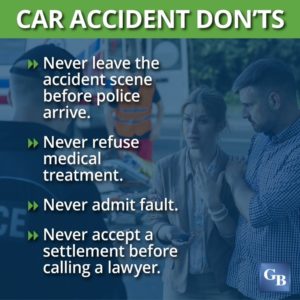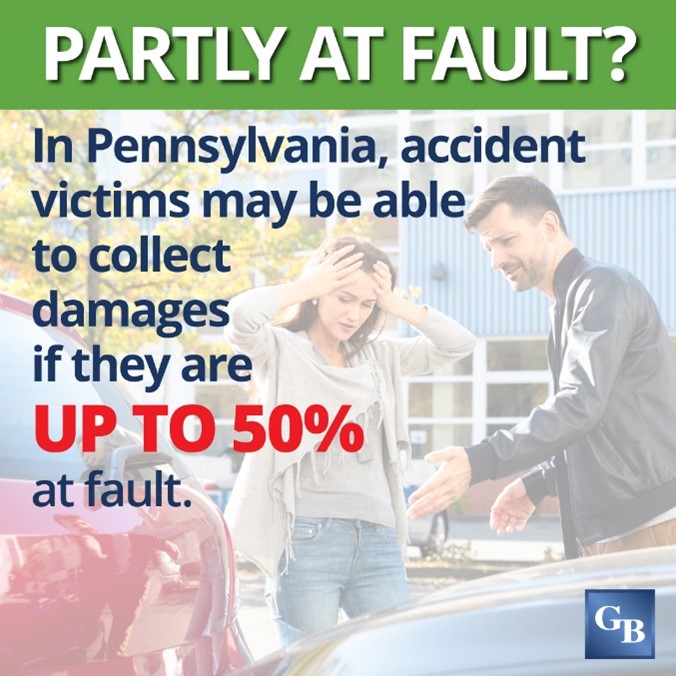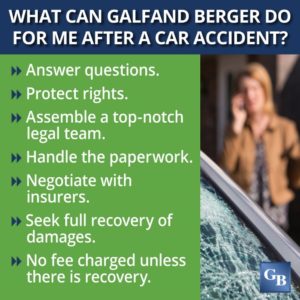Car Accident Frequently Asked Questions
Serious accidents disrupt everything. Anyone involved in a car accident is bound to face many questions about what will happen going forward. In these situations, reaching out to an experienced car accident lawyer is essential. Clients can place their trust in legal counsel to answer their questions and provide sound advice at every turn so they can focus on getting back to normal instead of dealing with paperwork and legal challenges.
Every car accident is unique. However, knowing some basics about the nature of a car accident, and knowing what do to if an accident happens, can be invaluable.
If there is any chance that anyone is injured, 911 should be called. As you are waiting for help to arrive, the driver should record the license plate numbers of vehicles involved and get the names, addresses, and telephone numbers of drivers and witnesses. Someone should photograph the vehicles and the area of the accident. Road conditions, traffic signs, and any damages to the vehicles should be noted. Seek medical treatment. Contact a car accident lawyer. It is important to remember that the actions taken at the accident scene can have a lasting impact on an insurance claim.
 What Should I Never Do at the Scene of a Car Accident?
What Should I Never Do at the Scene of a Car Accident?A driver must never leave the accident scene before police arrive. Motorists must not admit fault to the police or anyone else. Even if a driver feels OK, they should not say so and they should never refuse medical treatment. A personal injury such as whiplash and herniated disks may not appear until days later. Drivers should never give statements to the other driver’s insurance company until speaking with a lawyer first. Unless there is danger, the vehicles involved should not be moved from the accident scene before the police arrive.
If someone is injured, the police must be called. If there is vehicle damage but no injuries, it is still wise to call the police unless the damage is very minor.
Drivers should provide their contact information, driver’s license, insurance card, and other facts when asked. Drivers should not admit fault. Additional comments may be incriminating. Car accidents are stressful situations and thinking clearly can be difficult. It is not unusual for individuals to make statements at the accident scene that they later realize were inaccurate. Witnesses may misconstrue statements as well.
![]()
If someone is injured or there is substantial vehicle damage, the police should be called anyway. A police record can be used as evidence for an insurance claim. Sometimes police reports contain errors, but a qualified lawyer may be able to request an amendment to the report if necessary.
Drivers should call their insurance company no matter who might be at fault. If a driver does not report the accident, their insurance company may try to deny coverage if the driver makes a claim later or if the other driver files a claim against them.
When filing a claim, drivers should provide as much information as possible about the circumstances of the accident, including the exact location, date, and time of the incident; weather conditions; police report if available; and information about the other drivers involved. If anyone is injured, it is best to contact a qualified car accident lawyer to help with this process and handle communications with the insurance companies.
![]()
This is not uncommon, unfortunately. A car insurance policy usually includes Uninsured Motorist/Underinsured Motorist (UM/UIM) coverage. This protection also applies in the case of hit-and-run accidents. If the other driver left the accident scene before the motorist was able to obtain their information, the motorist can file a claim with their own insurance company to seek compensation up to the UM/UIM limits in their policy.
The best place to start is by reading the Declaration Sheet on the policy. It will explain the types of coverage in effect, such as liability, medical benefits/personal injury protection (PIP), collision, comprehensive, and UM/UIM. It will also list the amount of each type of coverage. The first number is the limit that one person can collect for injuries. The second number is the highest amount that the insurer will pay for an accident in which more than one person listed on the policy is hurt.
In most cases, a driver will not need to appear in court. Most claims settle out of court. Legal counsel will work with the victim to negotiate a settlement amount for full recovery of damages. If the other driver’s insurance company agrees to this amount during negotiations, the case will not go to trial. Hiring a skilled lawyer with negotiating experience can help ensure the injured party obtains the best possible outcome without going to trial.
There are several types of damages victims may be able to seek in a personal injury claim, including but not limited to the following:
These are examples of compensatory damages. A qualified lawyer will examine all possible damages that may be incurred by an accident victim when calculating the amount of a personal injury claim.
A driver should not supply any statements to insurers without speaking to an attorney first. If the other driver is at fault, it is highly likely that their insurer will attempt to persuade the victim to accept a settlement that is less than full recovery. Opposing insurers may also be looking for the victim to make incriminating statements that could provide them with justification for denying or minimizing the claim.
![]()
The answer is no. If someone has been injured in a car accident, they should consult with a qualified car accident lawyer before providing medical records or any other information to opposing insurance companies.
Drivers should not accept a car accident insurance settlement without speaking with a lawyer first. The settlement will likely be much lower than they deserve. If the accident was not their fault, they may have grounds for suing the other driver. However, the other driver’s insurance company may offer the victim a settlement to avoid the cost of a lawsuit. The legal team at Galfand Berger LLP has successfully taken cases to court for clients who were initially offered low settlements.
Motorists should not take a cash settlement from an insurance company without speaking with a lawyer first, even if they have medical bills as a result of their accident. The driver’s insurance policy should cover at least part of their medical bills while the driver and their lawyer are in the process of seeking recovery for damages. Accepting an early settlement may prohibit the victim from obtaining the full amount that they deserve.

In Pennsylvania, accident victims may still be compensated for damages if they are up to 50 percent at fault. However, accident victims are not always in the best position to assess fault. Reaching a firm conclusion about fault typically requires a thorough investigation, coordinated by a qualified car accident lawyer. Automobile defects, weather conditions, and other factors may reveal additional accident causes. In addition, a police officer’s opinion of who was at fault usually is not admissible evidence unless the officer actually witnessed the accident.
The answer is yes. If a driver owns two policies and cancels the insurance on one vehicle while it still is registered, they may be ineligible to collect benefits from their other auto insurance if they are hurt while driving the uninsured car. Motorists are also ineligible for auto insurance benefits if they are injured while operating a recreational vehicle not intended for highway use, or if the accident occurred while they were intentionally trying to hurt someone or attempting to flee the police.
It depends on who is at fault. If a driver is at fault, their insurance coverage should pay for car repairs if the policy includes collision coverage. If the accident was not their fault, they may have the option of filing a claim under the other driver’s insurance. It is best to consult the insurance company about options. In all cases, drivers should get an estimate for repairs from a reputable body shop and provide them with the claim number and the adjuster’s contact details. In the case of a serious crash, however, the lawyer may advise the driver to refrain from getting the car repaired to preserve evidence in case the manufacturer may be held liable.
Depending on the circumstances of an accident, one or more third parties may be held liable for a car accident, including but not limited to the following:
It is always important to preserve the vehicle in its wrecked, not repaired, state if there is a chance that the auto manufacturer may be held liable for the accident.
![]()
Past accidents should not affect a driver’s ability to file a personal injury claim. However, the other driver’s insurance company may attempt to use past accidents to assign blame and minimize the claim. An experienced car accident lawyer can help build a strong case even if the driver has had criminal convictions, bankruptcies, or car accidents in the past. The victim’s lawyer can prepare for these arguments as long as the victim shares any and all information about past incidents that could be held against them.
Victims may be entitled to other sources of compensation in addition to their car insurance coverage. These sources may include Workers’ Compensation if the accident happened while on the job, Social Security Disability, sickness and accident benefits, and life insurance. A qualified lawyer can help coordinate these benefits to maximize recovery amounts.
If a victim believes they may be entitled to file a claim, time is of the essence. A car accident lawyer should be contacted as soon as possible for a consultation. Although the statute of limitations for personal injury claims in Pennsylvania and New Jersey is two years, victims may only have a few months or less if employees of state or local governments could be held liable for the accident. More importantly, launching a thorough investigation as soon as possible is critical to preserving evidence for filing a claim.
It depends on whether the rideshare driver’s Uber or Lyft app was turned on or off at the time of the accident. If the app was off, the driver was not on the job and Uber or Lyft cannot be held responsible. In that case, the claim must be filed against the driver’s personal insurance carrier. If the app was on and the driver was either carrying passengers or available for service at the time of the accident, the driver was acting in the scope of employment. In this situation, damages may be paid by a combination of the commercial insurance coverage of Uber or Lyft and the driver’s personal insurance coverage.

First and foremost, if you or a loved one has been injured in a car accident, you should seek experienced legal counsel. The Philadelphia car accident lawyers at Galfand Berger LLP include a team of 20 highly qualified lawyers who are dedicated to the principle of helping injured people get justice. We have represented injured individuals and their families for more than 75 years. To schedule a free and confidential consultation, call us at 800-222-USWA (8792) or contact us online. From our offices in Philadelphia, Bethlehem, Lancaster, and Reading, Pennsylvania. Pennsylvania, we proudly serve clients throughout Pennsylvania and New Jersey, including Allentown and Harrisburg.
Notifications